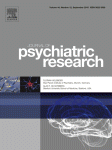 The Journal of Biological Chemistry has posted another of its inscrutable and opaque retraction notices, this one for a study first published in September 2011. The retraction reads in full: Continue reading Another opaque notice from the JBC, for paper author says is correct and valid
The Journal of Biological Chemistry has posted another of its inscrutable and opaque retraction notices, this one for a study first published in September 2011. The retraction reads in full: Continue reading Another opaque notice from the JBC, for paper author says is correct and valid
Category: by paywall status
Journal retracts antipsychotic study when all subjects’ PET scans turn out to be unreliable or invalid
 The Journal of Psychiatric Research is retracting a 2010 paper claiming to show a relationship between quetiapine (Seroquel) and certain lab tests and brain scans, after it turns out the brain images were either unreliable or invalid.
The Journal of Psychiatric Research is retracting a 2010 paper claiming to show a relationship between quetiapine (Seroquel) and certain lab tests and brain scans, after it turns out the brain images were either unreliable or invalid.
Here’s the notice for “Relationship between dopamine D2 receptor occupancy, clinical response, and drug and monoamine metabolites levels in plasma and cerebrospinal fluid. A pilot study in patients suffering from first-episode schizophrenia treated with quetiapine”: Continue reading Journal retracts antipsychotic study when all subjects’ PET scans turn out to be unreliable or invalid
Second helpings: Immunology journal retracts paper for plagiarism, then U Bari investigation reveals fraud
 The journal Immunopharmacology and Immunotoxicology has retracted a 2011 paper by an Italian nursing researcher who lifted text and data from a previously published work, and made up results to fill gaps, too.
The journal Immunopharmacology and Immunotoxicology has retracted a 2011 paper by an Italian nursing researcher who lifted text and data from a previously published work, and made up results to fill gaps, too.
Here’s the notice: Continue reading Second helpings: Immunology journal retracts paper for plagiarism, then U Bari investigation reveals fraud
A first? Papers retracted for citation manipulation
 In what appears to be a first, two papers have been retracted for including citations designed to help another journal improve its impact factor rankings. The articles in The Scientific World Journal cited papers in Cell Transplantation, which in turn appears to have cited to a high degree other journals with shared board members.
In what appears to be a first, two papers have been retracted for including citations designed to help another journal improve its impact factor rankings. The articles in The Scientific World Journal cited papers in Cell Transplantation, which in turn appears to have cited to a high degree other journals with shared board members.
Here’s publisher Hindawi’s statement on the matter, which involved their publication The Scientific World Journal: Continue reading A first? Papers retracted for citation manipulation
Canada’s Memorial U says “substantial data misrepresentation” described by retraction notice was unintentional
 Yesterday, we reported on a retraction in the Journal of Neuroscience for “substantial data misrepresentation.” When we posted, the authors’ institution, Memorial University in Newfoundland, Canada, had not been able to respond to our questions yet, because of the long Canada Day weekend. This morning, they sent us the following statement, which describes the errors that led to the retraction as unintentional: Continue reading Canada’s Memorial U says “substantial data misrepresentation” described by retraction notice was unintentional
Yesterday, we reported on a retraction in the Journal of Neuroscience for “substantial data misrepresentation.” When we posted, the authors’ institution, Memorial University in Newfoundland, Canada, had not been able to respond to our questions yet, because of the long Canada Day weekend. This morning, they sent us the following statement, which describes the errors that led to the retraction as unintentional: Continue reading Canada’s Memorial U says “substantial data misrepresentation” described by retraction notice was unintentional
Journal of Neuroscience retracts federally funded Canadian study with “substantial data misrepresentation”
 The Journal of Neuroscience is retracting a paper by researchers at Memorial University in Newfoundland, Canada, after a university investigation found “substantial data misrepresentation” in the work, which was funded by two major federal agencies.
The Journal of Neuroscience is retracting a paper by researchers at Memorial University in Newfoundland, Canada, after a university investigation found “substantial data misrepresentation” in the work, which was funded by two major federal agencies.
Here’s the notice: Continue reading Journal of Neuroscience retracts federally funded Canadian study with “substantial data misrepresentation”
Clinical Endoscopy retracts sedation paper, creates neologism in process
 Clinical Endoscopy, the official journal of the Korean Society of Gastrointestinal Endoscopy, has retracted a 2011 paper on sedation practices.
Clinical Endoscopy, the official journal of the Korean Society of Gastrointestinal Endoscopy, has retracted a 2011 paper on sedation practices.
Although the retraction statement is underpowered for information, it has a charming neologism. To wit, the announcement for the paper, “Comparison of midazolam alone versus midazolam plus propofol during endoscopic submucosal dissection,” is a “noticement.”
Unfortunately, that’s about all that’s interesting about this retraction. Or rather, that’s the only thing on which we can comment, given the notice itself:
Continue reading Clinical Endoscopy retracts sedation paper, creates neologism in process
Authors retract PLoS Medicine foreign health aid paper that had criticized earlier Lancet study
 On May 8, PLoS Medicine published a paper by Rajaie Batniji and Eran Bendavid of Stanford University, about “whether development assistance for health provided to developing country governments increases health expenditures.”
On May 8, PLoS Medicine published a paper by Rajaie Batniji and Eran Bendavid of Stanford University, about “whether development assistance for health provided to developing country governments increases health expenditures.”
That paper caught the eye of the Center for Global Development’s David Roodman. He began a May 14 blog post about the study, “The Health Aid Fungibility Debate: Don’t Believe Either Side,” as follows: Continue reading Authors retract PLoS Medicine foreign health aid paper that had criticized earlier Lancet study
Withdraw that emotion: Psych journal retracts two Stapel papers on mood
 Two more papers from Dutch fraudster Diederik Stapel have been retracted. Both appeared in the journal Psychological Science in 2008, with the same, evidently unwitting co-author, Kirsten Ruys, of Tilburg University.
Two more papers from Dutch fraudster Diederik Stapel have been retracted. Both appeared in the journal Psychological Science in 2008, with the same, evidently unwitting co-author, Kirsten Ruys, of Tilburg University.
Here is the notice: Continue reading Withdraw that emotion: Psych journal retracts two Stapel papers on mood
Reverse tissue engineering: data reuse causes retractions of three papers from German organ researchers
 The body count has reached three for a group of German tissue engineers who appear to have cloned their data in many of their publications.
The body count has reached three for a group of German tissue engineers who appear to have cloned their data in many of their publications.
Tissue Engineering Part A has retracted one of the papers from the investigators, titled “Clinically established hemostatic scaffold (tissue fleece) as biomatrix in tissue- and organ-engineering research,” which was published in 2003.
The notice states: Continue reading Reverse tissue engineering: data reuse causes retractions of three papers from German organ researchers